When Terry originally started this thread of thought, she was of
the mind that it would just be a bit of news. But as I read, I
found myself spluttering and heying, wanting to get in a word here
and an "Oh yeah?" there. After all, I myself did not
need to imagine some of her series-interrupting scenarios.
 |
|
| Series
of Doom. |
Series literature -- fiction and non-fiction -- is ubiquitous.
It knows no genre and it knows no bounds. From the 'Blank for Dummies'
series to the 'World's Greatest Literature' (I believe that there's
such a thing, isn't there; if not, you marketing types know where
to contact me!), series fiction essentially rules the publishing
world. But to readers it presents both opportunities and challenges.
Let's listen in as Terry D'Auray starts the ball rolling with her
original take on series mystery.....Terry?
Series novels
are the mainstay of the mystery genre. Mystery writers, who have
slaved to create a winning / complex / moody / eccentric
anchor character, to surround him/her with interesting and lively
supporting
players, are loath to abandon their hard-wrought creations after
just one book. (In fact, some writers are loath to abandon their
creations ever!) Mystery readers, judging by the number of these
titles that top the best-seller charts, love series characters.
We form long-term attachments to these series characters, relish
watching them grow and change, and get into and then get out of
trouble. A good series can offer all the satisfactions of a long-term
relationship without any of those annoying domestic squabbles.
Dipping into a series midway is just not acceptable to most serious
readers -- it's cheating and makes you feel bad. Which creates
an enormous problem when you catch on to an intriguing series that's
already multiple books old. Go back and start from the beginning
like you know you should (meanwhile the author continues to turn
out more, putting you ever further behind)? Or, just sigh deeply
and pass on the whole kit and caboodle? TLT (too little time).
It's a black or white dilemma, not gray.
[But no, wait, it's very gray! It's gunmetal gray! I've started
many a series in the middle, and been both burned and rewarded.]
|
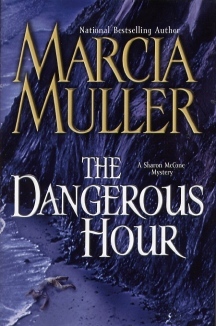
|
A
dengerous assumption.
|
(Series authors,
of course, may take a somewhat different view, preferring that readers
begin not at the beginning but simply wherever
they happen to hook up. Just so long as they buy the damn book.
And series authors are all particularly careful to provide enough
back-story in each novel so that it can adequately stand on its
own and readers can get the gist, if not the full taste, of what's
come before. But imagine reading Marcia Muller's newest Sharon
McCone book. 'The
Dangerous Hour', featuring a mature and confident
Sharon now managing the large staff of her own detective agency,
without knowing the young and naïve Sharon McCone from All
Soul's Legal Cooperative, a law office and quasi-commune in San
Francisco's Mission District. [ 1 ] Or meeting Lawrence Block's
Matt Scudder first in say 'A Long Line of Dead Men' without knowing
the hard-drinking, grim and tortured Scudder of 'Eight Million
Ways to Die' or 'When the Sacred Ginmill Closes'. Or first hooking
up with the mature Elvis Cole in 'The Last Detective' without experiencing
the wise-cracking tough guy awash in Disney paraphernalia from
'The Monkey's Raincoat' or 'Sunset Express'.)
But occasionally, series writers whose books have intrigued, whose
books you always meant to read but never managed to actually get
in front of your face, issue get-out-of-jail -free cards. They
write stand alones. It's a perfect chance to test drive the author,
try out their prose and their narrative style without investing
in multi-book series catch-up. Two well-regarded series authors
are currently offering series-amnesty books.
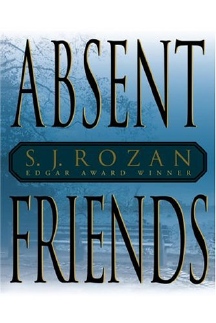 |
|
| For
absent readers as well. |
S.J. Rozan's series (8 books and counting) featuring Lydia Chin
and Bill Smith, PI's in New York are hardboiled, atmospheric and
superbly plotted; they're regularly included in lists of the best
of hyper-modern crime fiction. Each book is written from one of
the PI's viewpoints, and they alternate, first Lydia, then Bill.
Rozan has won a Shamus, Anthony and an Edgar for her efforts, along
with a large and loyal following. I read the first, 'China Trade'
way back when, but for reasons unremembered but certainly not attributable
to the novel, just never read the rest. I was ever-so-tempted to
break my own rule and pick-up the series midway with 'No Colder
Place' a few years back, but, well, I didn't, and I'm now 7 books
behind.
Rozan's newest, 'Absent Friends' (Delacorte Press, $24) is a non-series
novel that follows a group of friends who grew up together on Staten
Island as they deal with the death of one of their members, a firefighter
killed in the 911 attack. Mixing old crimes and new revelations,
'Absent Friends' looks to be a meaty mix of crime story and human
story, of past and contemporary tragedies, written with a sure
hand in elegant prose.
|
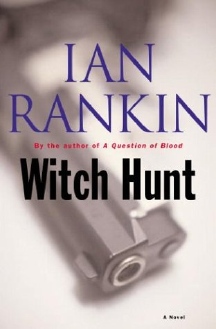
|
Not
a police procedural.
|
Ian Rankin's John
Rebus series has long intrigued me, in part because of its atmospheric
and haunting Edinburgh setting, but mostly because
of the character of Rebus himself. He's a classic loner fighting
the demons of past failures with booze and cigarettes, at home
with the disenchanted and the lowlifes, struggling outside the
mainstream. All in all, just my kind of hero - make that anti-hero.
An added plus is Rankin's own off-beat career path – from
grape picker, to swineherd, to taxman, to punk musician, to best-selling
author. Not many former swineherds writing these days. Having failed
to start reading these novels back in the 80s when I should have,
I now face the daunting task of catching up to 14 Rebus police
procedurals. But Rankin has given me a momentary reprieve by releasing
a stand-alone novel 'Witch Hunt' (Little, Brown & Co, $19.95),
which looks to be something entirely different. The first clue,
the protagonist is an "ingenious" female assassin. Second
clue, she's named "Witch" for her abilities to beguile
and disguise. 'Witch Hunt' is an espionage novel, not a police
procedural, promising twists and action of worldwide impact. Sounds
grand to me.
Terry just turned in this update on Ian Rankin's bit o' serial
amnesty...
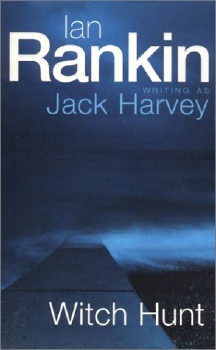 |
|
| Not
a "Jack Harvey" novel. |
It turns out that
Ian Rankin's 'Witch Hunt' is not a new work, but a reissue of a novel
originally published in 1993, written
by Rankin under the name Jack Harvey. It was the first of a three-book
espionage series – 'Bleeding Hearts' and 'Blood Hunt' being
#2 and #3. Now, reissuing older works is not an uncommon commercial
act these days - publishers often leverage the success of well-received,
well-known authors by reissuing everything they've ever written
(think Alice Sebold, Dan Brown and a multitude of others), and
that's fine. In fact, it's often better than fine for an author's
fans who want to read absolutely everything that author has ever
written. I just wish they'd be a little more open about what they're
doing so that readers can set expectations accordingly. I'm not
calling for a confession-of-commerce here, just simple disclosure.
The title page, had I read it completely, does show that the book
was originally published in 1993, but says nothing about the pseudonym
or the series. Rankin's website, however, does have the full confession.
At the end of the day, does it really matter whether this is a
reissue of something old, or something entirely new? Well, yes,
in this case, and probably more often than not among reading junkies.
I'd originally looked at 'Witch Hunt' as a chance to try Rankin
on for size, to get a sense of his prose and perspective, and this
older work, published over 10 year ago, is likely not to be the
best measure of that. On the other hand, I'd probably have bought
it anyway, simply to see how the current master of Tartan Noir
tackles Ian Flemingesque espionage.
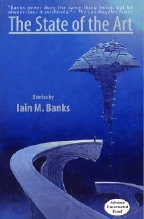 |
|
| More
than amnesty, exoneration. |
|
 |
|
| ...or
amnesty. |
|
Terry's not the
only one to receive a "get out
of jail card free" recently. I got one from my own Ian --
not exactly, that's Iain, as in Iain M. Banks. Since much of the
space opera I read is reputedly grandfathered by Iain M. Banks'
famous Culture series -- started in back in 1987 with 'Consider
Phlebas' -- I've been wanting to read this series and author for
about five years. But the series is a pretty imposing monument.
Consisting of six thick novels, I made the leap a while ago and
actually bought a first edition hardcover of the first book in
the series. The rest will follow; after 'Consider Phlebas', I can
read (in order)
'The Player of Games'
'Use of Weapons'
'The State of the Art'
'Excession'
'Inversions'.
To make things even easier, Night
Shade Books has recently released a new version of 'The State of
the Art' with over 20 pages of 'A Few Notes About the Culture'.
'The State of the Art' is a collection of Culture short stories
(and the title novella), but in 'A Few Notes About the Culture',
Banks steps forward and offers his insights into his own series.
It's an unusual step that's a great reward for those starting the
series. More than series amnesty -- it's exoneration.
But nothing gets you reading like a current release. So I was quite
glad to see Banks tackle a new universe in his latest novel, 'The
Algebraist'. And having read that, I can see what all the fuss
is about. Banks is a talented and very funny writer. Reading the
standalone gave me an idea of the texture and feel of the books
in the series. And I'm off, up and away.
|
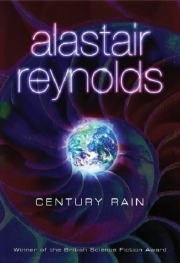
|
Reynolds'
new standalone.
|
For me, one of
the problems with series fiction is that though series can have an
end, they often don't. A writer who offers answers
on both counts is Alastair Reynolds. Readers of this website should
know by now that I consider his actually, satisfyingly finished
'Inhibitors' series one of the finest pieces the genre has to offer.
Complex, baroque, emotional, imaginative, mysterious -- Reynolds
does it all in beautifully turned prose. The series started with
'Revelation
Space', a novel which really wanted a sequel. But he
followed it up with 'Chasm
City', which, while it can be read as
a standalone set in the same universe as 'Revelation Space',
doesn't answer many of the questions raised by the first novel.
The next two novels -- 'Redemption
Ark' and 'Absolution
Gap' answered all the questions
inspired by 'Revelation Space', with 'Chasm City' providing a sort
of backdrop and depth to the series. Still, for a reader confronted
by these novels for the first time, there's a pretty hefty investment
involved. For those who'd like to read this author before getting
involved, then, there's the upcoming 'Century Rain', which promises
to offer a hard-boiled mystery combined with galaxy spanning science
fiction. My suspicion is that readers will be ordering up the series
before they even finish 'Century Rain'.
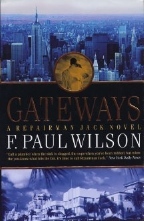 |
|
| Not
for beginners. |
On the other hand, as much as I enjoyed 'Gateways', the most recent
novel in F. Paul Wilson's Repairman
Jack series, I really can't
recommend it for beginners. But while the Repairman Jack novels
have something of a backlog -- it starts with 'The Tomb', then
continues with 'Legacies', 'Conspiracies', 'All the Rage', 'Hosts',
'The Haunted
Air', then 'Gateways' -- I can authoritatively say
that they’re a very fast read. But should readers require
an example of series amnesty, they can always plump for Wilson's
science fictional side with 'Sims', or his horror side with 'Midnight
Mass'. Wilson's prolific enough to offer pretty much annual amnesty,
as well as an annual repairman Jack novel, which this year will
be the brand-new 'Crisscross'.
Then there are the series that you really need not read in order.
The best example of that is Terry Pratchett's 'DiscWorld' series.
This series has reached the rather unique point of having so many
novels that it's sifted itself into sub-series. Recently, I started
with the very first novel
in the series-- really, a collection of three novellas,
'The
Color of Magic'. I then skipped about DiscWorld,
reading one of the most famous titles, 'Mort'
-- a much ripped off novel, may I say -- that stood well on its
own. 'Night
Watch'
was a very fun read, and remarkably well written, but there was
a certain feeling that I'd missed out on some of the character
interactions, being as it was at the end of a particular sub-series
that deal with the policemen of DiscWorld.
|
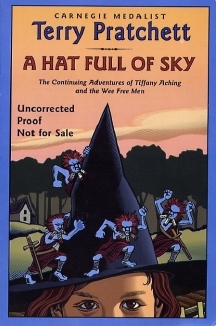
|
A
hat full of series, and series within a series.
|
'Monstrous
Regiment'
stood a bit better on its own, though Sam Vimes -- the featured
character of 'Night Watch' -- made an appearance. Still, for Pratchett,
the main thing is the humor, and character schmaracter, damn, the
jokes are always pretty damn funny, no matter which Pratchett title
you pick up. 'The
Wee Free Men' offers a peculiar sort of series
amnesty for would-be Pratchett readers. It's set in DiscWorld,
but in such a way that the reader need not really care. And it
too has spawned a sequel, 'A Hatful of Sky'. You've got to read
fast to keep up with Pratchett, who has another new DiscWorld book
out as well -- 'Going Postal'. Of course, Pratchett makes that
easy with stuff that's quick and light, but pithy.
Series fiction is supposed to be something hard and fast. Either
you're writing a series or your aren't. Except when you're a science
fiction writer and you're not writing a series so much as you're
exploring a universe you've created. Neal Asher's first full-length
novel exploration of his Polity universe was 'Grindlinked',
an over-the-top spy story chock-a-block full of monsters, cyborgs
and world-skipping weirdness. Though it was set in a universe he
created in earlier works, like 'Parasite' and 'Runcible Tales',
it works
perfectly fine as a wonderful, standalone piece of space opera.
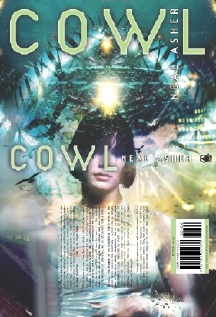 |
|
| Series
amnesty from Neal Asher -- all the style but an utterly
different content. |
He followed this
up with 'The
Skinner', set in the same universe,
but bringing in all new characters and settings. Some of the details
that made 'Gridlinked' such a pleasure are present, but you couldn't
exactly call it serial fiction. You can read 'The Skinner' and
enjoy the almost zen-like levels of violent predation without having
read 'Gridlinked', though, as ever, you'd be well advised to read
the first novel, well -- first. He followed up 'The Skinner' with
'The
Line of Polity', which was in fact a sequel to 'Gridlinked',
bringing back his burnt-out space-based James Bond character Cormac
and his opposite, the unknowable alien presence that calls itself
the Dragon, while introducing a bevy of new -- and utterly compelling
characters. But then Asher took a break from the Polity Universe
in 'Cowl'.
According to Asher -- who wrote me this morning -- "...if
a writer has also been interspersing their series with standalone
novels, I'm inclined to focus on all their writing rather than
just the series. Standalones also give the new reader a way in
to that author's writing and may incline them to buy the series
from the start. That's my aim with books like Cowl."
Mission
accomplished! Whereas the Polity novels are quite comfortably described
as Space Opera (performed by a meth-pumped heavy metal band), 'Cowl'
is what you could only call 'Time Opera' (with the same backup band). Like Space Opera,
it takes the tropes of a hoary SF staple, in this case time travel
instead of space travel, and injects them with a huge scale, lots
of action and Neal's usual set of memorable players, human and
otherwise. It's unmistakably Neal Asher, no doubt about it. It's
got big monsters, colorful characters, and a simplistic-seeming
presentation that proves to be quite complex as Asher layers on
bigger monsters and the kind of deadly twists that Time Opera encourages.
'Cowl' stands on it's own, but it's a perfect introduction to Asher's
Polity universe. It’s got all the style, but a completely
different content.
|
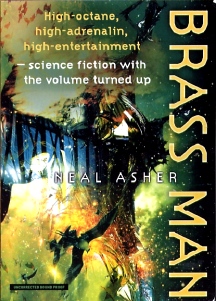
|
Serial
satisfaction, Neal Asher style.
|
Having offered
his potential readers Serial Amnesty in 'Cowl', Asher rewards his
regular readers (and anyone who reads 'Cowl'
is certain to become a regular reader) as he returns to the Polity
universe in his next novel, 'Brass Man', scheduled by Pan Macmillan
for April of 2005. This time, not only is Cormac back, but more importantly
to Asher's many
readers,
the
highly entertaining Mr. Crane has returned. In 'Gridlinked', Mr.
Crane was a psychotic robotic assassin who gave Cormac a run for
his money. This time around, he's been resurrected to help hunt
the Dragon. The novel begins on an Out-Polity world known as Cull,
where ferocious insectile monsters roam, complicating, to say the
least, the lives of the planet's inhabitants. A knight-errant who
calls himself Anderson decides to light off after a dragon. Mr.
Crane is certain to complicate this quest. Asher clearly has a
handle on both serial fiction and serial amnesty, to the delight
of his readers.
Series fiction really does offer the serious reader
a serious dilemma. Start at the beginning or jump in the middle
and hope to swim.
The end result is that there are even more books out there to read
-- and buy. That's a way to gate your reading. Ask yourself --
can you afford to start reading DiscWorld in first editions. The
answer is probably not. 'The Color of Magic' will set you back
thousands of dollars. On the other hand, sometime later this year
or early next year, you'll be able to get a brand new, signed limited
edition of 'Rakhoshi', which is F. Paul Wilson's starting point
for the Repairman Jack series, for a mere $45.00. I found 'Consider
Phlebas' for a mere $70.00 -- a huge bargain in the world of book
collecting. You'll likely dash out a couple of hundred for signed
first edition of Alastair Reynolds' 'Revelation Space'. Not your
firstborn, but a nice night on the town. Of course, 'Revelation
Space' will offer you several nights in the cosmos -- and an opportunity
for re-reading. With a bounty like that, money is no object, right?
[ 1 ] This is precisely what I did, and I have no need to imagine
it. What happens is that you really focus on the writing more than
the character-arc developments. So for example, in Muller's case,
I was able to see quite clearly that she's a fantastic writer of
prose. Her work is so amazingly clean that it's a great joy to read.
I couldn't have cared a whit about Sharon McCone's checkered past
because I was utterly immersed in her compellingly presented present.
For this reader, dipping in to the series enabled me to completely
ignore the overarching character-arc that McCone has developed across
the series of novels and enjoy the skills that Muller puts into each
individual novel. Now, as far as series fiction goes, the continuing
evolution of the character is often one of the most compelling parts
of the story. Since I wasn't privy to any of McCone's past, I might
have missed out on some of the pleasures of her latest novel, but
I believe that it also enabled to more clearly enjoy other aspects
of her writing that might go unnoticed if you're fully immersed and
invested.
On the other hand, when I skipped the first seven letters of the alphabet to
read Sue Grafton's 'H is for Homicide', I found myself most interested in the
characters who would not be returning. So there's certainly a risk when you dip
into a series in mid-stream. -- RK [ Return ]
|
|











